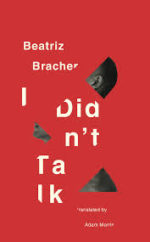“The revelations of testimony,” “the narratives of witness” … during times of emergency, and emergency is ever present, we extol the virtues and necessity of these forms of expression. In I Didn’t Talk, Beatriz Bracher’s second novel and the first to be rendered in English, an educator named Gustavo recalls the decades of violence and persecution in Brazil. But Bracher cares little for cultivating grievances. She documents the wound, not the bullet’s agenda. She insists that we work our way through the disruptive language spoken by the one who has been profoundly hurt. She has produced an essential work on our times – but she cares little for our need for closure, only for our receptivity.
 When I Didn’t Talk (Não Falei) appeared in 2004, Brazil was entering a six-year period of unusual economic growth and political stability. It was said that spectacular profits from the state-managed oil company, Petrobas, would trickle down to everyone. Finally, the decades of military coups, corrupt politicians and hyperinflation would be regarded as history. But Bracher, like her narrator Gustavo, is more interested in what returns than in what purports to progress.
When I Didn’t Talk (Não Falei) appeared in 2004, Brazil was entering a six-year period of unusual economic growth and political stability. It was said that spectacular profits from the state-managed oil company, Petrobas, would trickle down to everyone. Finally, the decades of military coups, corrupt politicians and hyperinflation would be regarded as history. But Bracher, like her narrator Gustavo, is more interested in what returns than in what purports to progress.
In 1964, when Bracher was three years old, a military coup (Golpe de ‘64) swept away Brazil’s shaky but democratically elected government, shut down the trade unions, repressed dissent and the free press, and aligned the country (with a nudge from the CIA) with the interests of the United States. The military ruled the country for the next 20 years. At age 30 in 1965, Gustavo was arrested and tortured, along with his spirited boyhood chum, brother-in-law and activist Armando. As his narrative begins, some 29 years have passed since his release. Gustavo was imprisoned for five years, then became a school principal and university instructor. Armando did not survive – but Gustavo didn’t talk, didn’t reveal secrets — he had none to spill. Now, Gustavo is approached by a young author named Cecília who wants to interview him about those times – just as he is about to sell the family home and move to the countryside.
 I Didn’t Talk is actually a book about talking – and a long query into the agency of testimony, the efficacy of words. “I was never a revolutionary, never took part in that enthusiasm,” says Gustavo. “I was excited. We, mankind: we were going to change a lot more than the world.” What kept him from committing to doctrine was his orientation to language itself: “Anyway the problem was this eccentricity with words: stopping before each one, taking it in my hands, massaging it, observing it from several angles, and only then, after it was deformed, allowing it to enter. As an eccentric, I felt ill suited to movements and organizations.”
I Didn’t Talk is actually a book about talking – and a long query into the agency of testimony, the efficacy of words. “I was never a revolutionary, never took part in that enthusiasm,” says Gustavo. “I was excited. We, mankind: we were going to change a lot more than the world.” What kept him from committing to doctrine was his orientation to language itself: “Anyway the problem was this eccentricity with words: stopping before each one, taking it in my hands, massaging it, observing it from several angles, and only then, after it was deformed, allowing it to enter. As an eccentric, I felt ill suited to movements and organizations.”
Gustavo avers that there are two kinds of speaking: “Both ways of talking are complete: the word that’s made and the word that’s in the making.” In his Brazil, the torturers are the ones with made words, tyrannically structured, orderly in procedure, geared to create an end-product. But the speaker on the margin, tortured by made words, presents words-in-the-making and invests the remnants of his being in the revelation of process. Regarding the speech of a witness, Bracher wants us to gauge its power and powerlessness. Can one hope to engender change through testimony? Or is the way we speak, its very disruptions and leaps, the source of the witness’ authority? As Gustavo prepares to sell his parents’ house, he comes across and cites passages from personal papers – his sister’s journal, his brother’s fictionalized novelistic accounts of their past. He finds little coincidence between his perspective and memories, and those of his siblings and others. How can testimony gather force if recollections don’t coincide?
 Bracher styles I Didn’t Talk as a narrative in-the-making – impulsive, vulnerable, brash, unpredictable, obsessive. As an educator, Gustavo asks, “This obvious first question concerning the schools is this: are we the world or do we prepare for the world?” He circles back repeatedly to his griefs – Armando, the ensuing death of his wife (Armando’s sister), separations and breakages. But his language is an extended preparation more than a summation. For what? Actual living in a world of cyclical hurt. Bracher’s prose can be propulsive and lyrical, then blunt or chagrined. But throughout the tale, a rigorous, sometimes brutal assessment prevails:
Bracher styles I Didn’t Talk as a narrative in-the-making – impulsive, vulnerable, brash, unpredictable, obsessive. As an educator, Gustavo asks, “This obvious first question concerning the schools is this: are we the world or do we prepare for the world?” He circles back repeatedly to his griefs – Armando, the ensuing death of his wife (Armando’s sister), separations and breakages. But his language is an extended preparation more than a summation. For what? Actual living in a world of cyclical hurt. Bracher’s prose can be propulsive and lyrical, then blunt or chagrined. But throughout the tale, a rigorous, sometimes brutal assessment prevails:
“My wife worked in the university clinic. She’d just obtained a position in a research hospital and was preparing for the admission exams to get her master’s degree. After defending my thesis in pedagogy, I’d decided once and for all to go into education and had recently managed to be made principal of a group of schools far from home. We worked a lot, both of us beneath the wing of a state that became more claustrophobic every day. We were mobilized, taking people in, hiding guns, debating what kind of revolution it would be. On the other hand, we lived among lunatics and children, something I now realize afforded us a view of the world where dictatorship and revolution weren’t as deterministic as they were in our friends’ hearts.”
 Language is Gustavo’s home, though it is furnished with enigmas. “I was never part of any organization,” he says, “and I had to guess at the correct discourse.” Bracher encourages our resistance to autocratic power – but she also asks for our hesitation over “correct discourse.” Gustavo says later, “A word is only worth its relation to other words in use at a given time. The process up to now, the word’s past struggles – none of that counts… How can I go on without due consideration of each word?” Is this the plaint of a pedant – or the counsel of a true subversive? One must credit his testimony, even if he bristles at the gratuitous bitterness of self-proclaimed change agents: “The world as oppression doesn’t sit well with me. Praising the strong and praising the weak results in the same violent game.” The lucid, discursive, nonstop density of I Didn’t Talk, seemingly aimless in its goal, comprises an artistic achievement by an author incapable of the claim that art can transform human destiny. Its purpose is to show what is there. As for Gustavo, his unachieved goal is “a totalizing vision throwing open the doors of the world, the whole world, its entire history, the primates, us, everywhere …”
Language is Gustavo’s home, though it is furnished with enigmas. “I was never part of any organization,” he says, “and I had to guess at the correct discourse.” Bracher encourages our resistance to autocratic power – but she also asks for our hesitation over “correct discourse.” Gustavo says later, “A word is only worth its relation to other words in use at a given time. The process up to now, the word’s past struggles – none of that counts… How can I go on without due consideration of each word?” Is this the plaint of a pedant – or the counsel of a true subversive? One must credit his testimony, even if he bristles at the gratuitous bitterness of self-proclaimed change agents: “The world as oppression doesn’t sit well with me. Praising the strong and praising the weak results in the same violent game.” The lucid, discursive, nonstop density of I Didn’t Talk, seemingly aimless in its goal, comprises an artistic achievement by an author incapable of the claim that art can transform human destiny. Its purpose is to show what is there. As for Gustavo, his unachieved goal is “a totalizing vision throwing open the doors of the world, the whole world, its entire history, the primates, us, everywhere …”
Recent articles in the global press have investigated why “the best and the brightest” in Brazil are leaving in droves. The country once again teeters on its familiar cusp of military rule. Unemployment is rising, the recession is deep. And the level of violence is unprecedented. This year, one out of every 10 homicide victims worldwide is Brazilian. The country is the fourth largest manufacturer of firearms. Kidnapping is rampant. As Gustavo says toward the end of his long reflection, “Brazil: love it or leave it – last one to leave, get the lights.” I Didn’t Talk, published on the 40th anniversary of Golpe de ’64, is a novel about our moment.
[Published by New Directions on July 31, 2018, 149 pages, $15.95 paperback]